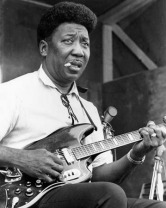"At first I played exactly like Chuck Berry for 6 or 7 months.... Then I got into older Bluesmen. Because he was so readily available I dug into Big Bill Broonzy; then I heard a lot of cats I had never heard of before, like Robert Johnson. Later, I turned on to B.B. King and it's been that way ever since."- Eric Clapton
Race in Britain

Rock and roll has strong roots in the musical styles of African American communities in the United States. This caused major problems for the spread of rock and roll during the early 1950’s because of the widespread racism and segregation found in the United States. Once again, Britain served as a haven for rock and roll by embracing early African American rock such as that of Chuck Berry and Muddy Waters. The British audience was not worried as much about who produced the music and much of the youth accepted it as a type of counter-reaction against the racism of their parents and the older generations (6). The lack of a major racial struggle in Britain allowed rock to prosper without a direct connection to ethnicity. The Rolling Stones are recognized as a major factor in the overall civil rights movement because they were one of the first mainstream artists to be proud of and talk about their African American influences in front of mostly white crowds (2). They would often bring older African American performers onto stage and give them credit in their interviews for their musical creativity. Amazingly, Keith Richards and Mick Jagger met after Richards noticed Mick Jagger carrying a Muddy Waters record and started talking about music (2). Additionally, their name’s inspiration is credited to the Muddy Water’s song “Rollin Stone” (2).
(2)- "RollingStones.com News.bio." The Rolling Stones. Web. 21 Apr. 2010. <http://www.rollingstones.com/artists/?a=1>.
(6)- Bradley, Dick. Understanding Rock 'n' Roll. Buckingham: Open UP, 1992. Print.

